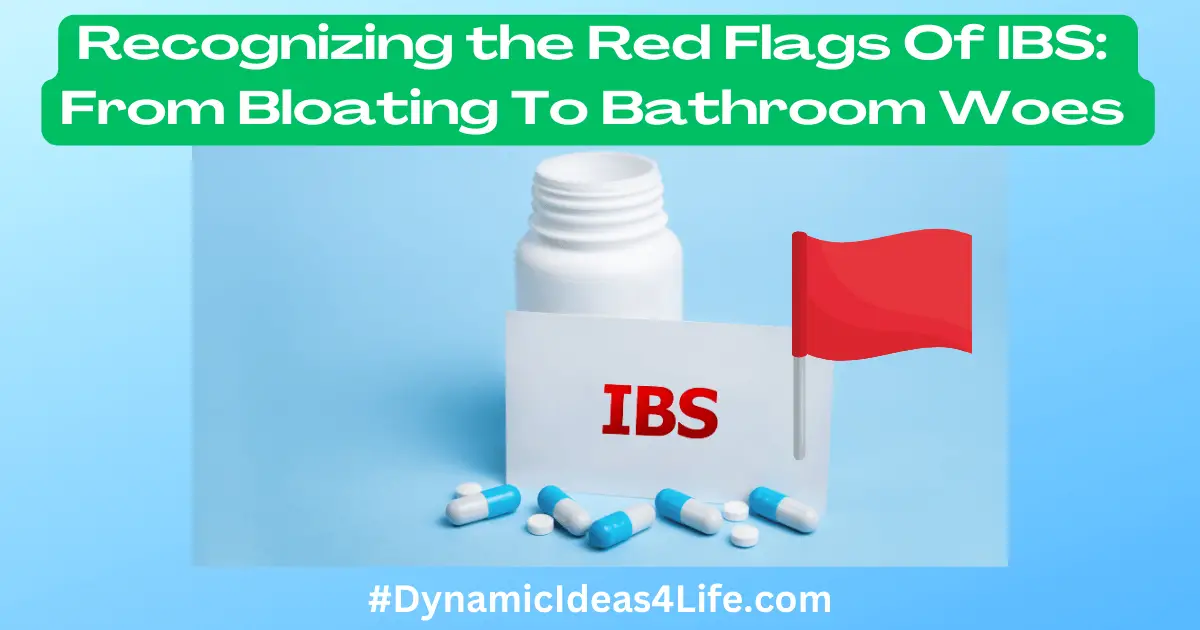Recognizing the Red Flags of IBS
Irritable Bowel Syndrome (IBS) is a common digestive disorder that affects millions of people worldwide. It is characterized by a variety of symptoms, including bloating, gas, and abdominal pain. Understanding and managing IBS is crucial for maintaining digestive health and improving overall well-being.
In this article, we will explore the basics of IBS, its symptoms, its impact on digestive health, triggers, differentiation from other digestive disorders, the role of gut microbiota, when to seek medical help, lifestyle changes for managing symptoms, diet modifications, and treatment options.
Understanding the Basics: What is IBS?
IBS is a chronic disorder that affects the large intestine (colon). It is characterized by a group of symptoms that occur together, including abdominal pain or discomfort, bloating, and changes in bowel habits such as diarrhea or constipation.
The exact cause of IBS is unknown, but it is believed to be a combination of factors including abnormal muscle contractions in the intestine, increased sensitivity to pain in the gut, and disturbances in the communication between the brain and the gut.
There are several misconceptions about IBS that need to be clarified. Firstly, IBS is not a life-threatening condition. While it can significantly impact a person’s quality of life, it does not lead to more serious diseases such as cancer or inflammatory bowel disease.
Secondly, IBS is not caused by food allergies or intolerances. While certain foods may trigger symptoms in some individuals with IBS, it is not an allergic reaction or intolerance to those foods.
Symptoms of IBS: Bloating, Gas, and Abdominal Pain
The most common symptoms experienced by individuals with IBS are typically bloating, gas, and abdominal pain. Bloating refers to a feeling of fullness or tightness in the abdomen caused by excess gas in the digestive system. Gas can also be a symptom of IBS, leading to flatulence or belching.
Abdominal pain or discomfort is another hallmark symptom of IBS, which can range from mild to severe and may be relieved by passing gas or having a bowel movement.
These symptoms can vary in severity and frequency from person to person. Some individuals may experience mild symptoms that come and go, while others may have more severe and persistent symptoms.
The frequency of symptoms can also vary, with some individuals experiencing daily symptoms and others having periods of remission where they are symptom-free for weeks or months.
The Impact of IBS on Digestive Health
IBS can have a significant impact on overall digestive health. The chronic nature of the condition can lead to ongoing discomfort and disruption in daily life. The symptoms of IBS can also interfere with normal bowel function, leading to changes in bowel habits such as diarrhea or constipation.
Untreated or poorly managed IBS can also have long-term effects on digestive health. Chronic inflammation in the gut can lead to damage to the intestinal lining, which can impair nutrient absorption and increase the risk of developing other digestive disorders such as leaky gut syndrome or small intestinal bacterial overgrowth (SIBO).
It is important to seek proper management and treatment for IBS to prevent these complications and maintain optimal digestive health.
Identifying Triggers: Food, Stress, and Lifestyle Factors
Certain foods, stress, and lifestyle factors can trigger or worsen symptoms in individuals with IBS. It is important to identify these triggers in order to manage symptoms effectively.
Common food triggers for IBS include high-fat foods, spicy foods, caffeine, alcohol, and certain types of carbohydrates such as those found in wheat, onions, garlic, and legumes.
Stress is another common trigger for IBS symptoms. The gut-brain connection plays a significant role in the development and exacerbation of IBS symptoms. Stress can lead to increased sensitivity in the gut, altered gut motility, and changes in the gut microbiota, all of which can contribute to IBS symptoms.
It is important to find effective stress management techniques such as meditation, deep breathing exercises, or therapy to help reduce symptoms.
Lifestyle factors such as lack of exercise, poor sleep hygiene, and smoking can also worsen symptoms in individuals with IBS. Regular exercise can help improve digestion and reduce stress levels.
Getting enough sleep and practicing good sleep hygiene can also have a positive impact on digestive health. Quitting smoking is important for overall health and can also help alleviate IBS symptoms.
Differentiating IBS from Other Digestive Disorders
It is important to differentiate IBS from other digestive disorders such as Crohn’s disease and ulcerative colitis. While these conditions may share some similar symptoms with IBS, there are key differences in terms of causes, symptoms, and treatment approaches.
Crohn’s disease and ulcerative colitis are both types of inflammatory bowel disease (IBD) that involve chronic inflammation of the digestive tract. Unlike IBS, which does not cause inflammation or damage to the intestines, IBD can lead to serious complications such as ulcers, strictures, and fistulas.
The treatment approach for IBD involves medications to reduce inflammation and manage symptoms.
The Role of Gut Microbiota in IBS
The gut microbiota, which refers to the trillions of bacteria that reside in the digestive tract, plays a crucial role in IBS. Imbalances in gut bacteria have been linked to the development and exacerbation of IBS symptoms. These imbalances can be caused by factors such as antibiotic use, poor diet, stress, and certain medications.
The gut microbiota helps with digestion, nutrient absorption, immune function, and the production of certain vitamins and neurotransmitters. When there is an imbalance in the gut bacteria, it can lead to increased inflammation, altered gut motility, and changes in the gut-brain axis, all of which can contribute to IBS symptoms. Probiotics, which are beneficial bacteria, can help restore balance in the gut microbiota and alleviate symptoms in some individuals with IBS.
When to Seek Medical Help: Recognizing the Red Flags
While IBS is a chronic condition that does not lead to more serious diseases, there are certain red flags that may indicate a more serious underlying condition. It is important to seek medical help if you experience any of the following:
- Unintentional weight loss
- Blood in the stool
- Severe or persistent abdominal pain
- Symptoms that worsen over time
- Symptoms that interfere with daily life or quality of life
These red flags may indicate a more serious condition such as inflammatory bowel disease, celiac disease, or colon cancer. It is important to get a proper diagnosis and appropriate treatment if any of these red flags are present.
Lifestyle Changes for Managing IBS Symptoms
Making certain lifestyle changes can help manage and reduce IBS symptoms. Stress management techniques such as meditation, deep breathing exercises, or therapy can help reduce stress levels and alleviate symptoms. Regular exercise can improve digestion and reduce stress levels. Getting enough sleep and practicing good sleep hygiene can also have a positive impact on digestive health.
In addition to stress management and exercise, dietary modifications can also play a role in managing IBS symptoms. It is important to identify and avoid trigger foods that worsen symptoms. Keeping a food diary can help identify specific foods that may be causing symptoms.
In general, it is recommended to eat a balanced diet that includes plenty of fruits, vegetables, whole grains, lean proteins, and healthy fats.
Drinking plenty of water and avoiding excessive caffeine and alcohol intake can also help manage symptoms.
Diet Modifications for IBS Relief
Diet plays a significant role in managing IBS symptoms. While there is no one-size-fits-all diet for individuals with IBS, there are certain dietary recommendations that can help alleviate symptoms. The low FODMAP diet is one approach that has been shown to be effective in reducing symptoms in individuals with IBS.
FODMAPs are a group of carbohydrates that are poorly absorbed in the small intestine and can ferment in the colon, leading to symptoms such as bloating, gas, and abdominal pain. The low FODMAP diet involves eliminating high FODMAP foods for a period of time and then gradually reintroducing them to identify specific triggers. It is important to work with a registered dietitian or healthcare professional when following the low FODMAP diet to ensure proper nutrient intake and avoid unnecessary food restrictions.
Exploring Medications and Therapies for IBS
There are several treatment options available for individuals with IBS. Medications such as antispasmodics, laxatives, and anti-diarrheal agents can help manage specific symptoms. However, it is important to note that medications may not be effective for everyone and may have side effects.
Therapies such as cognitive-behavioral therapy (CBT) and gut-directed hypnotherapy have been shown to be effective in managing IBS symptoms. These therapies focus on addressing the psychological factors that contribute to IBS, such as stress and anxiety.
They can help individuals develop coping strategies and improve their overall well-being.
Alternative approaches such as acupuncture, herbal remedies, and probiotics have also been explored for the management of IBS symptoms. While some individuals may find relief from these approaches, it is important to consult with a healthcare professional before trying any alternative treatments.
Conclusion
In conclusion, understanding and managing IBS is crucial for maintaining digestive health and improving overall well-being. IBS is a chronic condition characterized by a variety of symptoms, including bloating, gas, and abdominal pain. It can have a significant impact on digestive health if left untreated or poorly managed.
Identifying triggers such as certain foods, stress, and lifestyle factors can help manage symptoms effectively. It is important to differentiate IBS from other digestive disorders and seek medical help if red flags are present. Making lifestyle changes, including stress management, exercise, and dietary modifications, can help alleviate symptoms.
There are also various treatment options available, including medications and therapies, for individuals with IBS. It is important for individuals with IBS to seek professional help and make necessary lifestyle changes for symptom management and improved digestive health.






Anxiety and Depression best ways to lower blood sugar BiOptimizers blood pressure supplements blood sugar support supplements Digestive Enzymes Supplement digital products Dr Sam Robbins Exercise Gut Health Healthy Living heart health HFL how to lower blood sugar levels How To Lower Cholesterol insulin resistance joint health supplement Keto keto dieting Keto Diet Weight Loss leaky gut supplements leptin resistance list Magnesium deficiency Matt Gallant mental health Mind and Mood Probiotics multivitamins Nootropics nutrient supplements Probiotics Probiotic Supplements proteolytic enzymes reverse type 2 diabetes stress and anxiety stress relief vitabalance vitamin c vitapost Wade Lightheart weight loss articles weight loss diet plans weight loss product reviews weight loss supplements weight loss tea






